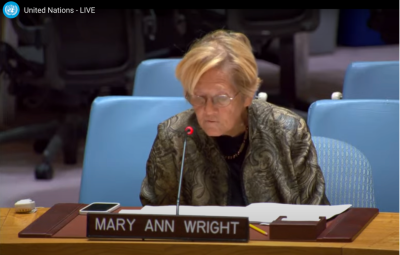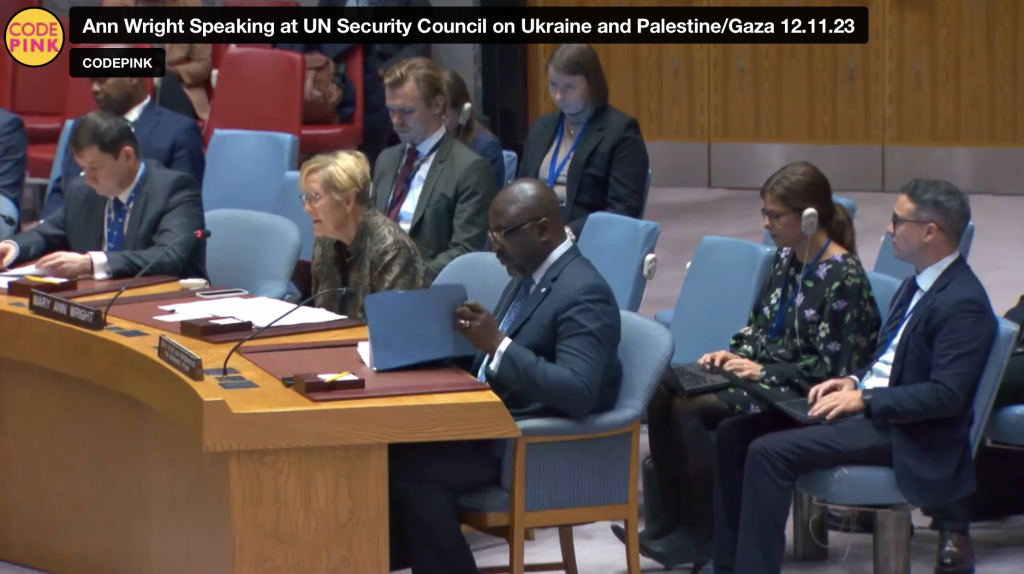Ret. Col. Ann Wright Unmasks the Truth in Arms Transfer Debate

All Global Research articles can be read in 51 languages by activating the Translate Website button below the author’s name (only available in desktop version).
To receive Global Research’s Daily Newsletter (selected articles), click here.
Click the share button above to email/forward this article to your friends and colleagues. Follow us on Instagram and Twitter and subscribe to our Telegram Channel. Feel free to repost and share widely Global Research articles.
***
In a heated session at the United Nations Security Council, diplomats engaged in a vigorous debate over the provision of arms to Ukraine amid the protracted war with Russia. The eleventh meeting on this pressing issue since Russia invaded in February of 2022 drew sharp criticisms from multiple speakers, who accused Moscow of deflecting attention from its own aggression.
While various briefers and delegates presented conflicting perspectives, CODEPINK member Ann Wright, a retired United States Army colonel and former diplomat, took a different stance. As a civil society representative, she introduced herself as a concerned citizen and taxpayer who resigned from the U.S. Government in 2003 in protest against the Iraq War.
Wright emphasized her opposition to the continued supply of weapons, asserting that it only serves to prolong conflicts.
The United States and its European allies have provided tens of billions of dollars in aid to support Ukraine over the past two years. With the war at an indefinite stalemate with the death toll rising, Wright argued that fueling conflicts with substantial amounts of weapons ultimately profits corporations and politicians, but not the innocent civilians caught in the crossfire. A position that antiwar groups like CODEPINK has held since the beginning of this deadly war.
Highlighting the lengthy process of conflict resolution, Wright drew parallels with historical conflicts, such as the Korean War, which required 575 meetings before reaching a ceasefire agreement. She underscored the devastating toll on human lives during U.S. funded wars, referencing the significant casualties in the Korean War.
Drawing attention to not only the lack of diplomacy but also an attempt to stop any form of negotiations from happening, she expressed concern along with the historical fact that the supply of weapons prevents the possibility of peace. Wright referred to the reports that informed Washington, D.C., and London had pressured the Ukrainian Government to avoid peace negotiations with Russia, emphasizing the importance of preserving diplomatic efforts.
In a powerful conclusion, Mary Ann Wright shared a poem depicting a plea in Gaza for children’s names to be written on their legs as a means of identification in the event of death due to Israeli bombings. While specifically referencing Gaza, she asserted that the sentiment applies universally to children in conflict zones, including Ukraine, Russia, Palestinel, or Yemen.
As the Security Council debates the “complexities’ ‘ of arms transfers and their impact on international peace and security, Wright’s testimony emphasizes the importance of addressing the root causes of conflicts and fostering meaningful resolutions. She makes the case that this is not, in fact, a complex issue nor should it be a debate. It is quite simple, more weapons only create more war and prohibit lasting peace.
Click here to watch the video.
*
Note to readers: Please click the share button above. Follow us on Instagram and Twitter and subscribe to our Telegram Channel. Feel free to repost and share widely Global Research articles.
Melissa Garriga is the communications and media analysis manager for CODEPINK. She writes about the intersection of militarism and the human cost of war. She volunteered for the Bernie Sanders 2020 campaign and resides in Burlington, VT’s sister city, Moss Point, MS.


